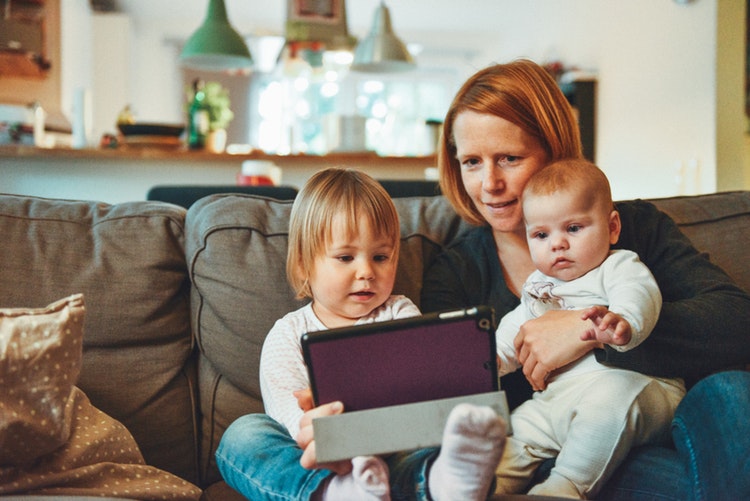Technology
Technoference: A habit parents should ditch during 2019

The reality is, technology is ever-present in our lives. Ninety-eight per cent of families are living in a home with at least one internet-connected device. Parents are using these devices on average 3.5 hours per day, their children an average of 2.5 hours per day. (Photo: Alexander Dummer/Unsplash)
You arrive at the park with your kids and encourage them to play. You sit down and pull out your phone. Your children come over and ask you to play chase. You say “in a minute” while scrolling through your social media feed.
We’ve all done it. It can be hard not to. But these moments, when devices interrupt interactions, are wreaking havoc on children, and family dynamics.
If you are looking to improve your family life this year, how about a commitment to disconnect from devices, and connect with one another more often?
The reality is, technology is ever-present in our lives. Ninety-eight per cent of families are living in a home with at least one internet-connected device. Parents are using these devices on average 3.5 hours per day, their children an average of 2.5 hours per day.
For children, this falls above the Canadian Pediatric Society’s recommended guideline of no more than one hour of high quality programming for kids aged two to five.
Families that eat together do better
Families are also frequently texting, checking social media and surfing the net during family time. Research suggests that almost 47 per cent of families report using mobile phones at the dinner table.
Having regular family meals and connecting with one another at the dinner table is important for child development. Essentially, families that eat together do better! But family dinners have been under siege by technology.
As a result, an educational campaign by Common Sense Media called #devicefreedinner, starring comedian Will Ferrell, was devised to help families avoid “technoference” at the dinner table, and find a healthy balance with media.
“Technoference,” or the intrusions and interruptions of digital devices during social interactions, has important implications for parenting today. It is next to impossible to simultaneously text while also engaging and responding consistently and sensitively to your child’s needs.
Mobiles devices can create sad kids, hostile parents
Research shows that parents who are distracted by their mobile devices not only interact less with their children, but are also more hostile towards their children.
Children competing with digital devices for their parent’s attention have been shown to be at risk for behaviour problems, including sadness and withdrawal, hyperactivity and temper tantrums.
Technoference does not go unnoticed by children. Over 50 per cent of kids report that their parents check their phones too much, and 36 per cent say their parents get distracted by their phones during conversations.
So, are you ready to commit to reducing screen time and increasing family connection time? If so, there are several ways to make this resolution a success:
- Make a family device plan
Device plans can help your family decide how and how often media will be used, as well as when and where it will be used. As a family, you can come up with solutions or alternatives for when someone feels like pulling out their device (e.g., pull out a favourite board game or go play soccer instead).
- Be a ‘media mentor’
Kids are learning about media from those around them, especially from parents. Parents should model healthy device habits, which includes using devices in moderation, and not letting them interfere with family time, sleep or being active.
- Have a device basket
When the family convenes together at the end of the work and school day, drop your devices into a designated device basket. If possible, set them to “do not disturb” as well.
- Take control of your phone
Your phone is engineered to capture your attention. That’s why icons are colourful and notification alerts are in red! The Center for Human Technology offers many options to avoid falling into the trap of being drawn in by your device. These include, turning off social media and email notifications, putting your phone on grey scale and keeping your home screen to essential apps only.
- Resist the desire to document
Capturing special moments is important, but they shouldn’t supersede the moments themselves. Try to be present and prioritize sharing moments with your child rather than your social media followers.
- Monitor your device habits
Just like a Fitbit counts our steps, a devices tracks our usage. Activate the screen time function on your phone and monitor your usage. Resolutions can be more successful when they are systematically tracked. Make a goal to cut your device usage by 10-25 per cent and monitor your progress.
- Understand your media habits
Understand the science behind why technology can be so addictive. For some parents, using devices may be an escape from their child’s difficult behaviours or a way to relieve some stress. Unfortunately, using devices as a temporary stress reliever can lead to children acting out more to regain their parent’s attention. As much as possible, try to find other ways of relieving stress, such as exercise, deep breathing or taking the to the park.
Technology and devices can be used thoughtfully and appropriately. Like everything else, they need to be used in moderation and they should not replace important activities such as family time, sleep, playing outside, exercise and face-to-face interactions and communications.
——
This article is republished from The Conversation under a Creative Commons license. Disclosure information is available on the original site. Read the original article:
https://theconversation.com/technoference-a-habit-parents-should-dit





















